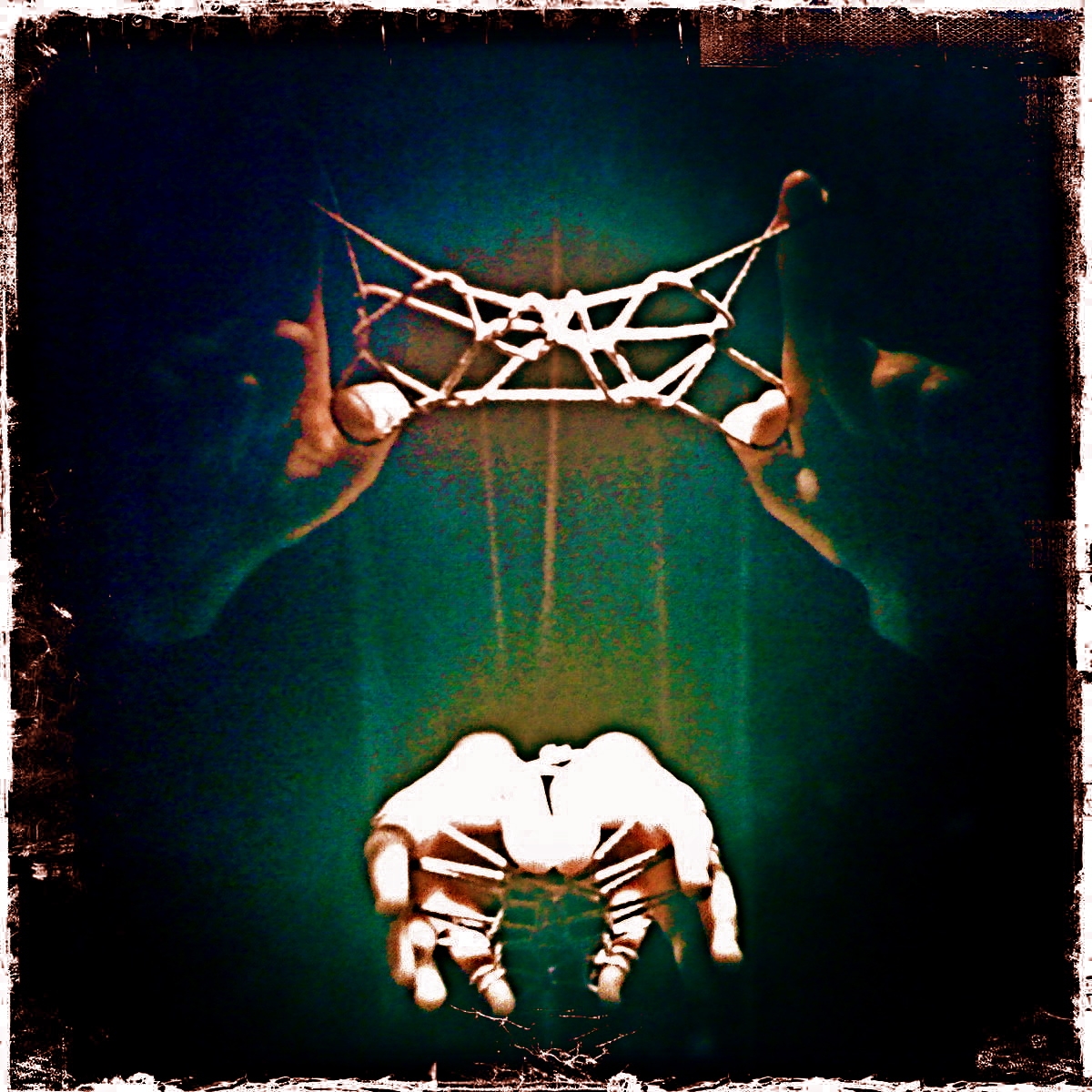
Image by Kristin Beeler
Sometimes the nurses call us by our full names. I don’t know why. Maybe it offers insulation from the inevitable, or maybe dying creates such gravitas the weight of our first-n-lasts give the halls the resonance a hospice deserves.
Like I said, I don’t know why. I do know the nurses are the only ones in the place resigned to our deaths.
Demetri–silk thong aficionado–isn’t dying until a Democrat is elected president. Michael isn’t dying until the tech stocks rebound. Newly converted, he carries a bible and preaches repentance. The only heterosexual in the northeast wing is Chad Quail. Michael disputes Chad’s sexuality, claiming he crotch-watched while they had tea in the sitting room. Demetri, of the opinion no queer eye can resist a pink thong, swears Chad is straight but not narrow. Demetri is correct. How do I know?
I am Chad Quail, and I am the longest living resident.
We share a house on Jump Street in St. Louis, Missouri. Our rooms are small and spare and nearly identical. Mine is decorated in Ocean Delight, and I have a beachscape on the wall above my desk. I spend my time on a computer researching addresses of old lovers, an activity that brings little satisfaction. Michael, the broke stockbroker with the newfound righteousness, says writing letters is my way of staying alive.
Bah.
A rap at my door, and a nurse enters. That’s another thing that comes with dying. Or should I say, goes with dying. Privacy. I could have been whacking off. Not that she’d care. The old biddy probably hasn’t had a lover in twenty years.
“You missed breakfast,” Mrs. Franklin says.
Her blue eyes look me up and down. She smells like strawberry shampoo and her uniform bulges at the waist. Like the night nurse, and the weekend nurse, and the nurses who fill in, Mrs. Franklin speaks in a professional voice tinted with diplomacy.
I shift the pad on my desk. Today, I addressed a letter to Skyler Langley, a young woman I remember vividly. She had brown eyes and boobs that hung to her belly button. Skyler wouldn’t let me touch her boobs, although one time I snuck a grope when we were doing the nasty. They were mushy as mashed potatoes.
We met in a bar when I was bumming around Tampa, Florida, and two days later we were naked in her trailer with an eight ball of coke and a needle. I’d never put drugs in my arm, but she sweet-talked me and I’ll never forget that rush. My heart beating like an insane drummer, my johnson so hard she rode it for hours. In the morning, we fought, I remember that, and she gave me a black eye and I think I broke her ribs. We were together for three months, then she went into rehab. I never saw her again.
“Time for your cocktail,” says Mrs. Franklin. She holds a silver tray with two glasses of water and a cup brimming with pills. At that moment, I am struck at how little we know each other. I suppose, if she had a son, he’d be about my age. She grasps my elbow and props me in my chair. That’s the thing about hospice nurses. They spend their days plumping pillows, buttoning collars, zipping pants, and when they see an out-of-kilter patient, they unreel their plumb bob and make an adjustment.
“I’m not a two-by-four.” I purposefully tilt toward the floor, and she shoulders me upright.
“You take your pills by lunch and I’ll sneak you an extra slice of apple pie.”
“How are the homos this morning?” Yesterday, Demetri curled into a fetal position. He’d better snap out of it; his birthday is next week and I ordered a gift, a heart-shaped thong, from Victoria Secret.
“Don’t you worry, Chad Quail, you take those pills and we’ll see about getting you that pie.”
“My shoulder itches.”
“Here?” Her fingernails ripple my skin, and my chin droops to my clavicle. The touching . . . I miss it most. In here, no one touches.
“A little to the left. . . there . . . that’s the spot.” I yip and paw my stomach. I like it when she smiles.
~
Dear Skyler,
How ya doin snookems? Long time no see.
I pause and ponder my chicken scratches, then flip a page and doodle. Sometimes I think about women I almost bedded but didn’t, the ones who said “no” for whatever reason. Was that divine intervention, a voice inside their heads saying, “Tell him you’re on your period, or you have a boyfriend, or you have the clap. Tell him anything but don’t let him stick it inside you.” Of course, back then I didn’t know I was sick, a small consolation, because I for sure knew I took chances with the needle. If I gave them something they couldn’t shake, it was their fault as much as mine. And visa versa. I mean, let’s get real, my illness isn’t an Immaculate Infection. Someone gave it to me. Was it Skyler? That guess is as good as any.
Dear Skyler,
Whatz up? Bet you don’t know who this is?
The doctors say I contracted the disease twelve years ago. Out of the 172 women on my list, that puts approximately 90 in the danger zone. But I can’t dwell on it. That’s why I write my letters, to keep my mind off things. I opt for my standard approach.
Dear Skyler Langley,
I regret to inform you that . . .
Skyler’s letter is letter number twenty-one. The previous twenty, mailed over the last eight months, elicited three responses. I haven’t read them. For now, telling them is enough.
WEDNESDAY IS LOVING HEART MIXER DAY, the noon hour when residents meet in the sitting room and stare at each other. It’s winter and ice crystals coat the windows. Outside, snow swirls and according to the weather channel the air is a crisp 28 degrees. The chairs, sofas, recliners, are arranged in a circle. A table in the center has chips and dip; and lemon punch in a crystal bowl. Michael and I are early. He holds a bible on his lap. His fingers, long and gaunt, riffle pages.
“It says it right here.” Michael’s eyes bulge in flesh-tightened sockets. “The unrighteous will suffer mightily at the hand of God.”
We are dying for the same reason, and while I think it’s intriguing my favorite body part played a role, Michael doesn’t appreciate the irony.
“Demetri’s still in bed,” I say. “I think this is it for him.”
From the southwest wing, cancer patients stumble into the room. They are five strong, three women and two men, bald-headed and scrawny, white gowns draped over their shoulders. In a way, I envy them and their disease. To die without guilt is a gift.
From the southeast wing come the Alzheimer victims. There is nothing in their eyes, not even a reflection. Nurses with firm hands push the wheelchairs. I don’t envy the ancients. To live without knowing is a fate no one deserves.
From the northwest wing, alcoholics file around the table and sit on the sofa along the wall, limbs swollen like boiled hotdogs. Their faces wear a perpetually surprised look, as though the bottle snuck up and hit them on the head.
“It’s like West Side story,” Michael says. “We’re the Crips, and the Lushes are the Bloods. The Chemos are the Mexican Mafia, and the Airheads are the Cosa Nostra–”
“Shut up,” I say.
“Fucking faggots,” an alcoholic says, and rocks back and forth.
“Chad’s not gay,” Michael says, and I’m surprised Demetri’s opinion dented Michael’s hard-boiled brain.
A woman, her dome shining under the fluorescent lights, speaks in a whispery voice. “Can’t we all get along?”
The joint cracks up. I laugh so hard snot runs out my nose. Michael pounds his knee, and the sour alcoholic has tears on his cheeks. It feels good to cut loose, like we staved off Grim Reaper for another day. Too soon, though, giggles subside. No one eats. No one drinks.
At 1:00, a voice on a speaker puts us out of our misery. “Ladies and gentleman, we hope you enjoyed the Loving Heart Mixer. Please return to your rooms.”
Glass enclosures line the hallway and inside each cubicle, ash-filled urns, like respectful sentries, watch our passage. It doesn’t surprise me residents who die here choose to remain here. We are modern-day lepers, the diseased limb society has severed. Up ahead, Michael slows and I sneak behind him and pinch his ass.
“Bitch.” He slaps my hand.
“Just trying to make you feel at home.”
“It doesn’t help.”
I am instantly sorry. Sexual overtures, even if they are made in fun, are a no-no among the dying. There is nothing attractive about two bone-racks slogging to their rooms so they can choke down their next round of horse pills.
I make a right to Demetri’s room and Michael continues down the hall. My friend, a knobby lump, lies under a blanket. All I can see is a tuft of black hair. I know he doesn’t want to talk. We have a lot in common, he and I. He was a mason, myself a carpenter, both drifters, both flunked out of college. Me because of a woman, him because of a man. On his walls dangle a variety of pink thongs, and I suspect they are there to remind him who he is. I stand quietly for a few minutes, then leave without saying goodbye.
IN THE GARDEN, March tulips are aflame. Clouds laze across the sky. Mrs. Franklin wheels me under an oak tree and says she’ll come back in an hour. Michael and Demetri are dead, and I’m strapped in a chair. Under my hospital gown is an elastic diaper, an embarrassing development, but my biggest worry is my fingers. Stiff and complaining, they make writing a chore.
Yesterday, I sent a letter to Joy Goochland. She was a bartender in Seattle when I was living out there and selling crank to college kids. She was fifty-five, fifteen years older than yours truly. I won’t lie. Glands under my throat were swollen and I’d had trouble shaking colds, so I suspected something was wrong. I didn’t dwell on it; the sex was too good to pass up.
“Chad Quail, you have a visitor.” Mrs. Franklin has returned, and with her stands a black-haired woman wearing a lavender blouse. The woman’s hair feathers across her forehead and she tucks the strands behind her ear. The curve of her throat stirs a memory too buried to surface, but I know her, I swear I do.
Mrs. Franklin leaves, and I study the woman’s face, trying to pick up a clue. When she speaks, her gaze sharpens and her words tumble. “You mailed my daughter a letter. She’s dead, I want you to know that. Been dead six months. She’s dead and she’s not coming back.”
The woman wraps her slender fingers around my wrist, squeezes until I wince and pull away. Her voice is hoarse, dark and dank, from a place I don’t want to go.
“My baby’s dead.”
I see her now, I see Skyler’s face in her mother’s, and I work spit around my mouth to loosen my tongue. The words don’t come at first, and when they do, they’re garbled.
“My name is Chad Quail and I’m a medical miracle. I should have died two years ago and the doctors don’t know why.”
“What?”
“I’ve seen seventeen Homos die. I’ve seen fourteen Chemos, seven Lushes, and four Airheads die and I’m still here. I’m still here and I don’t know why.”
“Didn’t you hear me? My baby’s dead.”
“Demetri died three days before his birthday. I still have his present in my room. Michael died on Valentine’s Day and wanted to be cremated with his bible. I’m still here, Chad Quail has outlived them all.”
The woman’s brown eyes, Skyler’s eyes, no longer focus on me. She turns, and walks down the curved sidewalk and disappears inside the hospice. My bowels relax, and sludge warms my crotch. I cross my arms and ponder the visit. What should I have said? Your daughter was a junkie and it’s a tossup who killed who. Bah. The blame game is for the uninfected.
IN THE MIDDLE OF JULY, the nurses hold a barbecue on the lawn, and if I worm up my pillow and look out the window, I can see residents in white gowns, some sitting in lawn chairs, others in wheelchairs, a few standing. Faces have changed but the illnesses have not. The only constants in the joint are the nurses; the floors, the walls, and the ceilings; the Wednesday, Loving Heart Mixer, which I no longer attend, and of course, me. It’s going on two and a half years, and I’m still here. Fourteen more Homos have died. I can’t keep up with residents in the other wings; lately the revolving door spins so fast I’ve lost count.
Nurses grill sausages and hamburgers. A breeze drives smoke downward, and a nurse coughs and turns her head. Under the oak, my favorite spot, a cancer patient nibbles a hamburger, then doubles over and vomit spews from his mouth. He puts down his plate and wipes his chin. An Alzheimer patient chews a hot dog, the pace of her jaw reminding me of a straining locomotive.
I wish the hospice would bring in someone dying of something different, anything, I don’t care. Give me a Muscular Dystrophy or a Lou Gherig’s Disease or a Parkinson’s. Give me anything but what I’ve got.
I’m sick of it all, but mostly I’m sick of writing these letters. The response stack no longer fits in the desk drawer, and envelopes are stacked alongside the computer. I’m working on a letter to Judy Prescott. My memory, once so clear, has hazed, and although she’s the last lover on my list, I can’t see her when I close my eyes. We met in a Greek restaurant in San Francisco. She smelled like Juicy Fruit, I do remember that. I also remember she was half my age, and liked rap. We didn’t last long. Oh! That’s right. She had red hair, close cropped, like she went to the barber instead of a stylist. I might have been her second or third lover. She hadn’t had many.
Today, I scratched out a consonant and tomorrow I’ll add a comma and then the day after tomorrow I’ll start on the message. The two words are barely legible, letters scrawled in starts and stops, but maybe she’ll recognize her name.
Mrs. Franklin bustles into the room. She takes my temperature and wipes sweat beads from my forehead. I close my eye, a slow droop, open it, then force my lips apart in what I hope is a smile.
“Why, Chad Quail,” she says. “Are you flirting with me?”
I nod.
She takes the pencil and pad; and puts it within easy reach. Although she knows how difficult it is for me to work my fingers, she has not offered to write my letters. I don’t hold it against her. Outside, a summer shower surprises the party, and the residents and the nurses scurry for shelter. Smoke from the grill whitens, then stops altogether. A patient in a wheelchair, a man with wiry, white hair, turns his face to the clouds and spreads his arms to form a cross. His gown is drenched and water drips from his elbows. It is a symbolic gesture. In here, everyone, sooner or later, welcomes death.
LABOR DAY COMES AND GOES, and I am still here. I’ve completed my letter to Judy Prescott and it’s folded inside a stamped envelope on my bed stand. October and November rumble in and out of my life, and I am still here. It’s been seven months since I received a response, and dust collects on the letter pile on my desk. I recognize some of the names on the return addresses—June Popular, Holly Mackinaw, Mary Sue Treadwell, Tyesaha Buttons—but some are unfamiliar and these I suspect are the fathers, the mothers, the brothers and sisters, the distraught husbands.
In December, Mrs. Franklin transfers to the Alzheimer wing, but she comes and sits with me in the evenings. I don’t know why. I weigh sixty-six pounds, and I’m all bone. Most of the time a white sheet covers me from neck to toe, but during the sponge baths, I can see, I can see what’s happened to me. My ribs peel from my sternum in hard curves, and my arms, thin as straws, lie motionless at my sides. My legs have atrophied and protrude from my pelvis like grisly crowbars. Chad Quail looks like someone attached a suction hose to his ass and sucked him dry. Where did he go? What happened to the 180-pound man, the sexy guy who could get any woman, what happened to him?
Now, with the Great Beyond closing in, when the guilt drawer opens I don’t have strength to slam it. Sleep is my only reprieve, but I’m scared, I’m scared to sleep. Most days, I stare at the ceiling and think about the letters. They are the only unknowns in my life. The only dumpsters I’ve not crawled into.
Outside the oak leaves flutter and twist in the wind, some floating to the ground, others clinging to limbs. Mrs. Franklin is by my bed, the letters in her lap, and she reads somberly. I catch a phrase now and then, but my gaze is on the ocean mural above my desk. There’s a small boy with a bucket and a red shovel, and he hovers over a sandcastle. Over his head, against the turquoise sky, a gull is in full flight. Mrs. Franklin’s voice drones in the background.
Go to hell.
I imagine the sounds of the beach; the rhythmic crash of breakers on sand; the growl of the motorboat in the distance; the faint buzz of a seashell held to the ear.
Thank you for having the courage. . .
I can smell sunscreen, mine? and cool, ocean air. It’s salty, and clean.
Bastard.
The sand is gritty under my feet, and the sun is warm on my face. The water laps against my legs, then my waist, but Chad Quail will go no further.
I forgive you.
Mrs. Franklin puts down the letters. She holds his hand. She wipes his forehead. Chad Quail, are you ready to mail it now? Are you ready to mail this last letter? He studies the sky, the water; he smells the air; he feels the wet sand between his toes. He focuses on the young boy, the boy on the sand with the shovel and the pail, the boy with the quizzical look, the innocent, the boy with a future. Life is short, Chad Quail thinks, and slides into the surf. Yes, he says over his shoulder, yes, please, if you have the time, please send that last letter. The waves lap his face and he strokes hard for the watery air. It’s time, he says, it’s time.
T. J. Forrester has a debut novel forthcoming February 1st, 2011. He wrote Miracles, Inc. while living in Virginia. The attic room was small, chilly in the winter, but his landlord was very kind and fed him when he was without food. His stories have appeared in numerous literary journals, including The Emerson Review, Harpur Palate, The Literary Review, The MacGuffin, The Mississippi Review, Potomac Review, and Storyglossia.
Read our interview with T.J. here.










